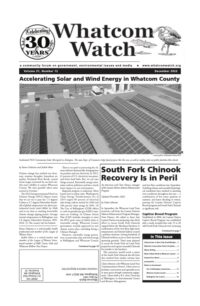by Whatcom Land Trust Staff
Southern resident killer whales, or orcas, are emblematic of the Pacific Northwest, but sadly their population is declining at an alarming rate. Three pods of these whales were listed as endangered in the United States in 2005. Since then, there has been an immense effort to restore and protect these beloved creatures.
There are currently six categories of challenges facing the southern resident killer whales: (1) prey, (2) vessels, (3) contaminants, (4) climate change, (5) funding and accountability and (6) future growth. Unlike other species of orcas, the southern resident pod’s primary source of food — an estimated 80 percent — is Chinook salmon. Chinook salmon are listed as a federally threatened species.
As an organization entrusted with the protection and preservation of wildlife habitat in Whatcom County, the Whatcom Land Trust focuses on acquiring and restoring riparian habitat with the intention of improving salmon populations (and therefore orca populations) along the Nooksack River. One of the primary focus areas has been the South Fork due to the high temperatures and low flow currently impacting this section.
The South Fork Nooksack can be 10 degrees Celsius hotter than the North or Middle forks, according to Alexi Guddal, education and outreach technician for the Whatcom Conservation District. “Chinook need cold water to survive, so it is incredibly important [for both salmon and orca recovery] to decrease the temperature of the South Fork to make it habitable for salmon species,” says Guddal.
Working to restore the Chinook salmon population is a vital step in the restoration and recovery of the Southern Resident killer whales.
So what can you do to help?
• Keep your tires aligned and inflated. One of the pollutants that harms salmon, called 6PPD-quinone, comes from our car tires, and, when the tires aren’t properly aligned and inflated, more of those particles tend to rub off into ditches and streams. 6PPD-quinone harms a salmon’s sense of smell and they rely on their olfactory senses to reach their spawning destinations — meaning impaired fish can’t reach their spawning destination to deposit their eggs. This means that new Chinook aren’t born, which, in turn, decreases the food source for our southern resident killer whales.
• Volunteer at community work parties. Community and organizational partnerships are vital in the effort to restore both salmon and orca populations. According to Guddal, “We can’t protect our natural resources unless we all work together.”
You’ll find more information about community work parties and other ways to get involved here: https://whatcomlandtrust.org/volunteer/.
.




























